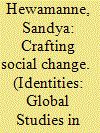| Srl | Item |
| 1 |
ID:
164300


|
|
|
|
|
| Summary/Abstract |
This article explores how former factory workers negotiate new identities in villages, as new brides, mothers and daughters-in-law, after 5–6 years of employment in an urban Free Trade Zone. I argue that their performances of self-discipline and disavowal of transgressive knowledges allow them to make use of the limited social, economic and political spaces available while gradually reshaping local understandings about the good daughter-in-law. Former workers’ strategic deployment of social conformity represents the foundation on which their entry into village social, economic, political spaces is based on. Although individual social conformity would conventionally be identified as everyday politics, I argue that former workers’ performance of self-discipline and social conformity is strategic and leads to changes in gender norms and village social hierarchies and thus represents a form of politics that is in between everyday and transformative politics – politics that creates conditions of possibility for social transformations.
|
|
|
|
|
|
|
|
|
|
|
|
|
|
|
|
| 2 |
ID:
171248


|
|
|
|
|
| Summary/Abstract |
Working in Sri Lanka’s urban free trade zones (FTZs) introduces Sri Lanka’s rural women to neoliberal ways of fashioning selves, which subsequently not only shape village entrepreneurial activities but also initiate negotiations in kinship, marriage, domestic arrangements, and community relations. The knowledges and networks that they develop while at the FTZ allow former workers to connect with global production networks as subcontractors, making them part of the cascading system of subcontracting that furthers the precarity of regular FTZ work. This article explores how these former workers manipulate varied forms of capital – social, cultural and monetary – to become local entrepreneurs and community leaders, while simultaneously initiating changes in rural social hierarchies and gender norms. When neoliberal economic restructuring manifests within local contexts it results in new articulations of what it is to be an entrepreneur and what it is to be a worthy, young, married woman. Overall, the paper sheds light on the fragmented and uneven manner in which neoliberal ethos take root in rural South Asia.
|
|
|
|
|
|
|
|
|
|
|
|
|
|
|
|